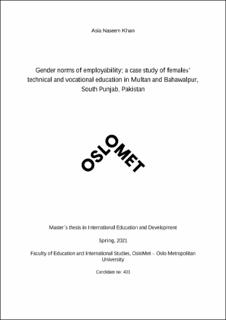Gender norms of employability; a case study of females' technical and vocational education in Multan and Bahawalpur, South Punjab, Pakistan
Master thesis
Published version
Permanent lenke
https://hdl.handle.net/11250/2976327Utgivelsesdato
2021Metadata
Vis full innførselSamlinger
Sammendrag
This report focuses on gender dimensions, in the context of Technical and Vocational Education and Training (TVET) in Multan and Bahawalpur in South Punjab, Pakistan. Gender among TVET to employability is an essential determent of the access to power and resources. By employing qualitative methodology, the report tried to identify TVET scenario, female-learners’ perceptions and factors hindering the acquisition of employable skills through this education. Data was gathered in the form of observation and semi-structured in-depth interviews. Through data-analysis, it was found that TVET programs for females, have potential, and may contribute to improved outcomes for females in Pakistan, but the significant limitations including the systematic reinforcement of traditional gender identities within and outside the school have a negative impact on females’ learning. Study-findings strongly indicated that gender norms lead to minimising females’ TVET participation. Familial and institutional barriers, meanwhile can be primarily attributed to strict social norms rather than being own determents of inequality. The financial dependency then again leads to structural imbalances which consequently solidifies already existed marginalisation. Study-conclusions suggest that in order to deliver the envisaged outcomes for females through this educational pathway, provision of gender-friendly learning environment and improved instructional practices are needed to make a substantive change. By doing so, females’ empowerment and gender equality through TVET learning can be encouraged and promoted.
